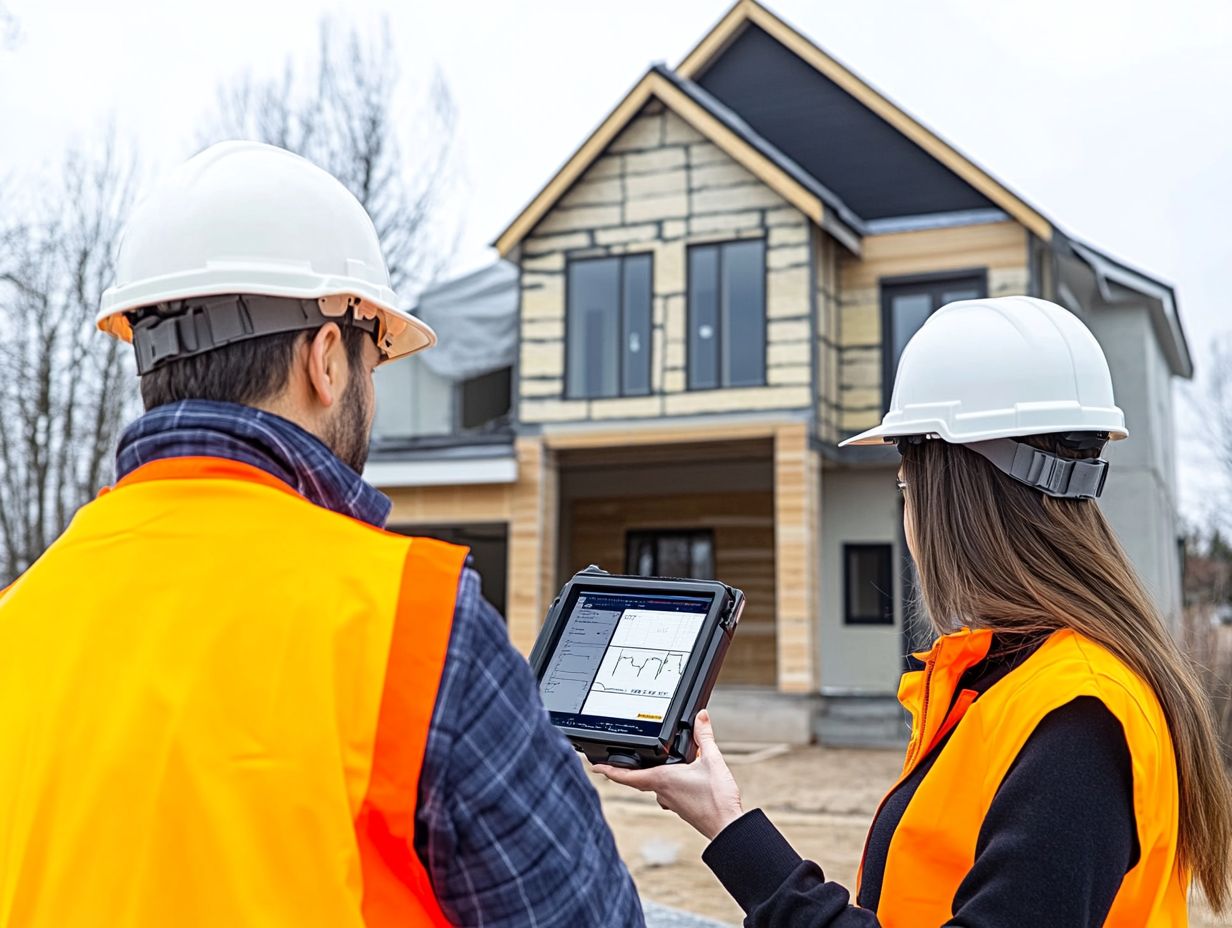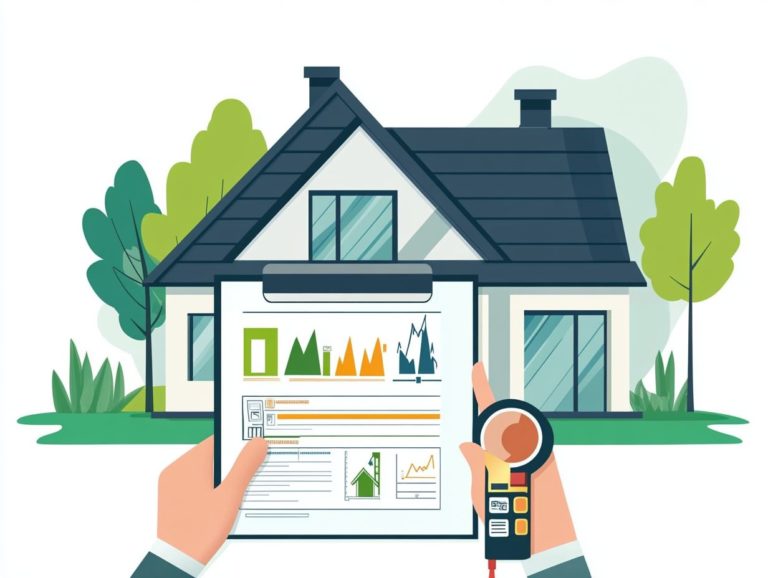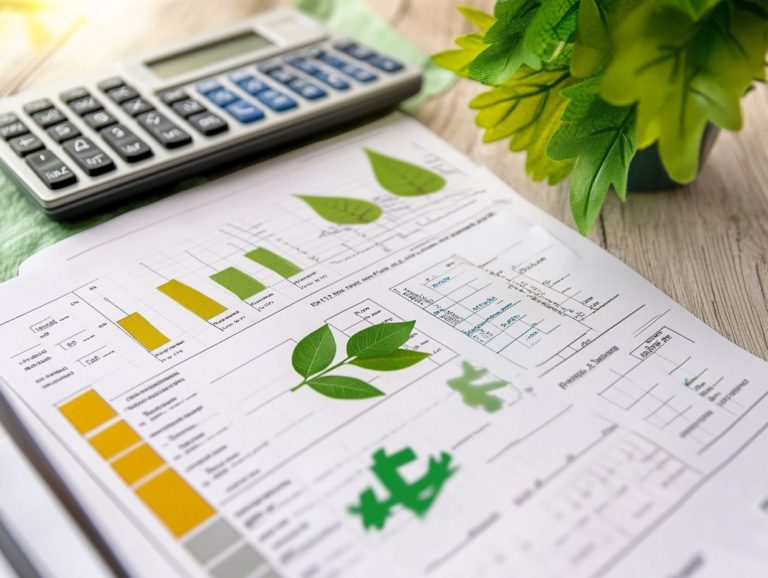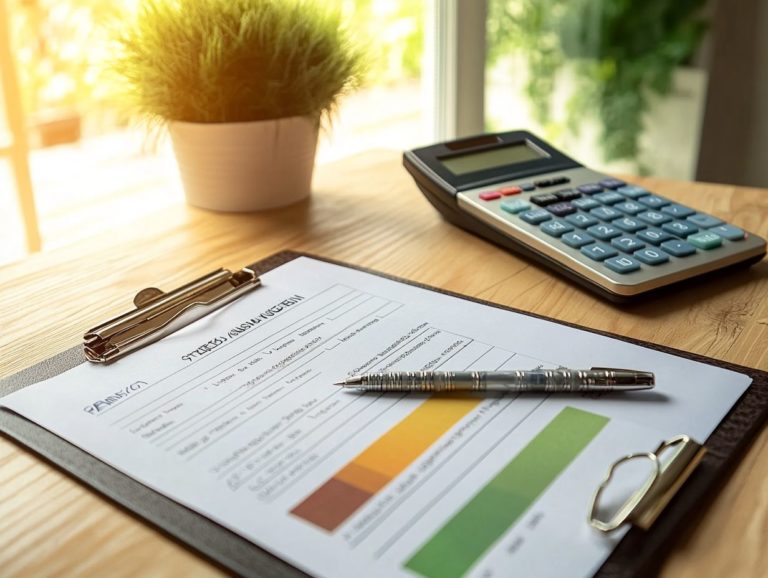Impact of Energy Audits on Property Value
Energy audits are comprehensive assessments that evaluate how effectively your property utilizes energy. They reveal opportunities for enhancement!
By delving into energy consumption, these audits lead to substantial cost savings and contribute to environmental sustainability. They are instrumental in elevating your property s value, as energy-efficient features are increasingly sought after in today s market.
This article will guide you through the intricacies of energy audits. We ll highlight their benefits, the various types available, and the importance of engaging qualified professionals for the task.
Explore how an energy audit can truly transform your property!
Contents
- Key Takeaways:
- What is an Energy Audit?
- Benefits of Conducting an Energy Audit
- How Energy Audits Affect Property Value
- Types of Energy Audits
- Hiring a Professional for an Energy Audit
- Energy Audit Processes
- Frequently Asked Questions
- What is the impact of energy audits on property value?
- How does an energy audit affect the value of my property?
- Do energy-efficient upgrades increase the value of my property?
- Are there any factors that may negatively impact the property value after an energy audit?
- Can I expect a significant increase in property value after an energy audit?
- Is it worth investing in an energy audit for the purpose of increasing property value?
Key Takeaways:

1. Energy audits assess a property’s energy use and efficiency, helping owners identify areas for improvement.
2. By reducing energy consumption and costs, energy audits can increase a property’s value and decrease its impact on the environment.
3. Factors such as location, age, and overall efficiency influence property value, and energy efficiency is becoming increasingly important for buyers and investors.
What is an Energy Audit?
An energy audit is a detailed assessment designed to evaluate your home’s energy consumption. It uncovers opportunities for boosting efficiency and conservation.
This process entails a meticulous examination of various systems, including heating, ventilation, and air conditioning (HVAC), insulation, and energy-efficient appliances. We assess their performance under specific climate conditions.
By identifying areas of energy loss, you can make informed choices about energy-efficient repairs, leading to potential cost savings and improved indoor air quality.
Benefits of Conducting an Energy Audit
Conducting an energy audit presents many advantages, including substantial savings on utility bills, improved energy efficiency, and enhanced comfort within your home.
Beyond immediate financial benefits, energy audits promote environmental sustainability by pinpointing energy conservation strategies and encouraging sustainable practices in residential settings.
You might also be eligible for federal tax credits when you invest in the energy-efficient upgrades suggested during the assessment.
How Energy Audits Affect Property Value
Energy audits can profoundly impact your property’s value by improving its energy performance and efficiency ratings. For more insights, consider understanding the cost-benefit of energy audits, making it more appealing to potential buyers and renters.
When you invest in a comprehensive energy assessment, you’ll likely discover enhancements in insulation, HVAC systems, and energy-efficient appliances. All of these contribute to a higher energy rating.
This not only enhances your home’s market competitiveness but can also result in increased rental income and significant long-term savings on utility costs.
Factors that Influence Property Value

Several factors influence your property value, especially in today’s market, where energy efficiency is a significant consideration for both buyers and renters.
Properties that pass a thorough energy audit often command higher prices due to energy upgrades that reduce operating expenses and improve thermal comfort.
These enhancements align with sustainability standards and help avoid compliance issues that could diminish your property’s worth.
Investments like superior insulation elevate a home’s energy performance, making it more attractive in both hot and cold climates.
Duct testing plays a vital role in uncovering leaks that waste energy, ultimately boosting the livability and marketability of your property.
Additionally, installing solar panels can provide potential homeowners with long-term savings on utility bills while serving as a compelling selling point, particularly in areas with high energy costs.
When combined with local climate conditions, these upgrades can significantly enhance your property s desirability, ensuring it stands out in a competitive market.
Ready to enhance your property’s value and energy efficiency? Schedule your energy audit today and watch your savings grow!
Role of Energy Efficiency in Property Value
The significance of energy efficiency in determining property value is immense, as it directly influences both operating costs and buyer perception. Energy-efficient homes are often viewed as more desirable, giving you a competitive edge in the real estate market.
By conducting energy audits and implementing the recommended energy-saving solutions, you can greatly enhance your property’s market appeal and overall valuation.
Properties with ENERGY STAR-rated appliances are hot commodities! They attract environmentally conscious buyers who are willing to invest more for reduced energy expenses and a smaller carbon footprint.
Smart heating, ventilation, and air conditioning (HVAC) systems enhance comfort while lowering utility bills, making these homes particularly attractive.
As sustainable living gains traction, buyers increasingly prioritize energy-efficient features, reflecting a broader shift in market preferences toward properties that promise long-term savings and environmental benefits. This approach boosts your home’s immediate marketability and contributes to substantial appreciation in value over time.
Types of Energy Audits
You ll find a variety of energy audits tailored to meet distinct needs, primarily divided into residential and commercial categories.
Home energy audits concentrate on individual residences, meticulously assessing energy consumption and offering personalized recommendations for energy-efficient repairs and upgrades.
In contrast, commercial energy audits take a broader approach, evaluating larger facilities to identify system-wide inefficiencies. These audits suggest improvements that can result in significant savings on operational expenses, enhancing overall efficiency.
Residential vs Commercial
Residential and commercial energy audits are worlds apart in scope and methodology, each finely tuned to their unique environments. When you opt for a residential audit, the focus is on the individual components of your home think insulation, heating, ventilation, and air conditioning systems, and energy-efficient appliances.
These audits equip you with actionable strategies to conserve energy effectively. In contrast, a commercial energy audit assesses larger buildings and facilities, focusing on comprehensive energy management and operational enhancements aimed at achieving substantial energy savings.
For residential audits, duct testing is a commonly employed methodology that reveals leaks and inefficiencies within your ductwork, allowing for targeted repairs that can boost overall energy performance.
On the commercial side, these audits often dive deep into extensive energy diagnostics, utilizing techniques like sub-metering and thermal imaging to identify inefficiencies in complex systems. This enables a streamlined approach to energy usage across various operations.
Despite their distinct focuses, both types of audits converge on a shared mission: enhancing energy efficiency and reducing costs. By implementing the recommendations from these audits, you can substantially lower your utility bills while also minimizing your environmental footprint, underscoring the immense value of energy-conscious investments.
Hiring a Professional for an Energy Audit

Hiring a professional auditor for your energy audit is essential for obtaining precise assessments and actionable recommendations for energy-saving solutions.
Qualified auditors bring valuable experience and certifications, such as HERS certification, to the table. They employ advanced tools like infrared cameras and blower door tests to pinpoint inefficiencies in your heating, ventilation, and air conditioning systems and other energy-consuming components of your home.
Their expertise guarantees that the energy audit not only addresses compliance issues but also supports your sustainability goals.
Ready to enhance your property’s energy efficiency? Consult a professional today!
Qualifications and Services Offered
When hiring a professional auditor for an energy audit, it’s crucial to consider their qualifications and the range of services they provide. This ensures a comprehensive evaluation.
Look for certifications from reputable organizations like ASHRAE (American Society of Heating, Refrigerating and Air-Conditioning Engineers) or ENERGY STAR. These certifications indicate that the auditor is knowledgeable about energy assessments and compliance issues.
Their services might include a detailed analysis of energy usage, recommendations for energy-efficient repairs, and strategies for meeting sustainability standards.
With a solid professional background, an energy auditor offers invaluable insights into enhancing the efficiency of your home or business. Their expertise translates into customized services, such as residential energy ratings that pinpoint potential savings and thermal comfort assessments designed to optimize your indoor climate.
Get ready for a thorough examination that ensures your energy systems are running at their best! By engaging well-qualified professionals, you can expect not just compliance with industry standards but also the implementation of effective energy-saving measures.
The blend of qualifications and comprehensive services sets the stage for significant cost reductions and improved environmental outcomes.
Energy Audit Processes
An energy audit is a detailed process that evaluates your energy use to spot inefficiencies. It begins with a professional auditor performing a preliminary assessment, which may include inspecting your HVAC system, insulation, and ductwork.
They then employ advanced techniques, like blower door tests, which measure how much air leaks out of your home, and infrared imaging, which uses special cameras to find places where heat escapes. This comprehensive analysis informs you about your energy diagnostics and offers actionable recommendations for improving energy efficiency.
After the initial evaluation, the auditor conducts a blower door test to measure your home’s airtightness. This step quantifies energy loss and helps identify necessary repairs.
Infrared imaging enhances this process by visually revealing thermal discrepancies in your walls, ceilings, and floors, exposing hidden insulation issues or moisture problems. By combining these sophisticated tools, the auditor provides you with a detailed report that highlights specific energy inefficiencies and outlines prioritized actions, leading to significant energy savings and improved comfort in your home.
Frequently Asked Questions
What is the impact of energy audits on property value?
Energy audits can have a significant impact on property value. They help identify potential energy efficiency improvements that can save money for the homeowner and increase the market value of the property, highlighting the benefits of professional energy audits.
How does an energy audit affect the value of my property?
An energy audit can positively affect your property’s value by identifying cost-effective ways to save energy and reduce utility bills. This makes your home more attractive to potential buyers.
Do energy-efficient upgrades increase the value of my property?
Yes, energy-efficient upgrades recommended by an energy audit can increase your property’s value. These upgrades improve overall energy efficiency and comfort, making it more desirable to potential buyers.
Are there any factors that may negatively impact the property value after an energy audit?
In some cases, energy audits may identify potential issues with a property’s energy efficiency, such as outdated insulation or HVAC systems. If these issues are not addressed, they may negatively impact property value. However, addressing these issues can ultimately increase the property’s value.
Can I expect a significant increase in property value after an energy audit?
The impact of an energy audit on property value can vary depending on the specific recommendations made and the current market conditions. However, the connection between energy audits and home value shows that implementing energy-efficient upgrades usually results in a noticeable increase in property value.
Is it worth investing in an energy audit for the purpose of increasing property value?
Yes, investing in an energy audit is worth it not only for the potential increase in property value but also for long-term cost savings on energy bills. Energy audits also help identify potential health and safety hazards in the home, which can impact its value.







